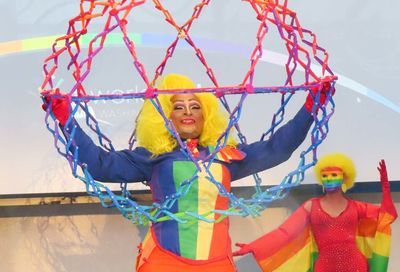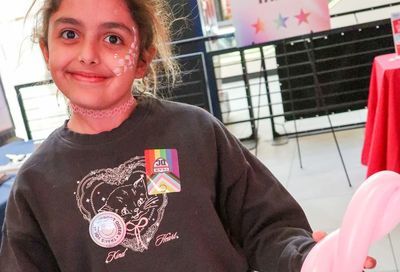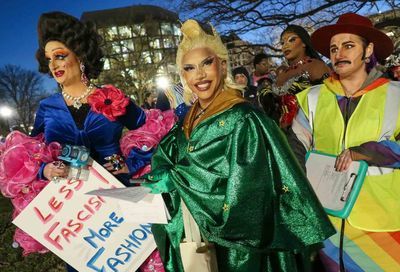GLSEN Launches 80+ “It’s Okay to say Gay!” Billboards Across Florida
Billboards are meant to send affirming message to LGBTQ youth and direct them to websites offering supportive resources.

GLSEN, the nation’s largest advocacy group for LGBTQ students, in partnership with Equality Florida, GLSEN Tampa Bay, GLSEN Collier, and SAVE LGBT, has launched a statewide educational campaign highlighting the harms of Florida’s so-called “Don’t Say Gay” law.
As part of the campaign, which is underwritten by the Jonathan Devan Lewis Foundation, GLSEN and its partners have launched more than 80 billboards across Florida, primarily concentrated in the Jacksonville, Miami, Orlando, and Tampa areas. All the billboards feature messages of affirmation for LGBTQ students and others negatively impacted by the law.
“Florida’s LGBTQ+ students and educators and their families are already experiencing the devastating harm of this so-called ‘Don’t Say Gay’ curriculum censorship bill. And, by the way, we call it ‘so-called,’ because it’s not really just about gay students that are affected,” notes David Eng-Chernack, deputy executive director for communications and development at GLSEN. “Some of the major groups of students who are affected in really devastating ways by this law, are BIPOC, trans, and nonbinary students, who already experience higher rates of discrimination and marginalization. So this bill exacerbates that problem even more.”
The billboards have two designs: one — a black type on a white background that says: “You are loved” and below, in bold type, “It’s okay to say gay!” and a second, featuring a tropical background picture and large cinema-style font, saying “It’s okay to say gay!” with pictures or drawings inside each of the letters “G,” “A,” and “Y.”
Both billboards direct viewers to a GLSEN-sponsored website, OkaytoSayGay.com, will include links to the websites of other LGBTQ-affirming organizations and other community resources that provide support for LGBTQ students.
The website will also link to Save LGBT’s website, which is intended to provide information to voters about upcoming elections or about possible legislation that could impact LGBTQ people’s lives. It will also link to a GLSEN national advocacy campaign, “Rise Up for LGBTQ+ Youth,” where visitors can download social media graphics touting the campaign and share it on social media platforms.
“The billboards are really meant to be a mechanism to get people’s attention. And because the billboards are outdoors, we wanted to make sure that the message was provocative, but easily digestible,” Eng-Chernack says. “The URL is memorable, and was done on purpose so that if you’re driving along a highway and you see this billboard, or you’re just walking on the street, you’ll remember it without having to write it down.”
According to research from GLSEN, 69% of LGBTQ students report having experienced verbal harassment based on their sexual orientation, and 58% report experiencing harassment based on their gender identity.
When it comes to treatment of LGBTQ students, more than one-third, or 37%, say they’ve been disciplined for public displays of affection that did not result in similar punishments for non-LGBTQ students. Over one-quarter of LGBTQ students, and 57% of transgender students, reported that they were barred from using a bathroom matching their gender. Another one-quarter of LGBTQ students, and nearly half of transgender students, were prevented from using their chosen name or pronouns in school.
Other forms of discrimination reported by LGBTQ students included being prevented or discouraged from including LGBTQ themes in extracurricular activities, being barred from forming or promoting a GSA, being disciplined for wearing LGBTQ-supportive apparel, being prevented or discouraged from playing school sports, or being unable to bring a same- gender date to a school dance.
While supporters of the Florida law complain that LGBTQ students and their concerns are overrepresented or given too much attention, only 9% of LGBTQ students said their school had adopted a comprehensive anti-bullying policy, only 8% said their school had a trans- or nonbinary-supportive student policy in place, and only 15% said they’d been taught positive representations of LGBTQ people, history, or events in class.
‘The hostile landscape in Florida, and, quite frankly, all across the county now, is one of the motivations behind this billboard campaign, because a vast majority of LGBTQ+ youth in Florida face harassment in school, and are denied access to affirming curricula and resources. They’re also facing erasure. By saying that you actually can’t say gay or talk about gay people in schools, what you’re effectively doing is erasing all of these students and saying to them, ‘You don’t have a right to exist,’ ‘You’re invisible,’ ‘We don’t care about you,’ ‘Your stories are not important,’ and ‘Representing you is unimportant, and your families are not important,” adds Eng-Chernack.
“LGBTQ+ young people in Florida, and nationwide, are under attack,” GLSEN Executive Director Melanie Willingham-Jaggers said in a statement. “Students deserve to see representation and feel support in their school communities, so while politicians try to erase queer youth from the classroom, we’re fighting back with a bold campaign for representation.
“These billboards are powerful displays of support, positioned near public schools all across the state to reach our young people where they are,” Willingham-Jaggers added. “We’re telling LGBTQ+ youth that they belong and support is available. We’re already seeing devastating impacts on LGBTQ+ youth, and we must expand and deepen our movement as we continue to speak out against censorship and discrimination.”
Support Metro Weekly’s Journalism
These are challenging times for news organizations. And yet it’s crucial we stay active and provide vital resources and information to both our local readers and the world. So won’t you please take a moment and consider supporting Metro Weekly with a membership? For as little as $5 a month, you can help ensure Metro Weekly magazine and MetroWeekly.com remain free, viable resources as we provide the best, most diverse, culturally-resonant LGBTQ coverage in both the D.C. region and around the world. Memberships come with exclusive perks and discounts, your own personal digital delivery of each week’s magazine (and an archive), access to our Member's Lounge when it launches this fall, and exclusive members-only items like Metro Weekly Membership Mugs and Tote Bags! Check out all our membership levels here and please join us today!























You must be logged in to post a comment.